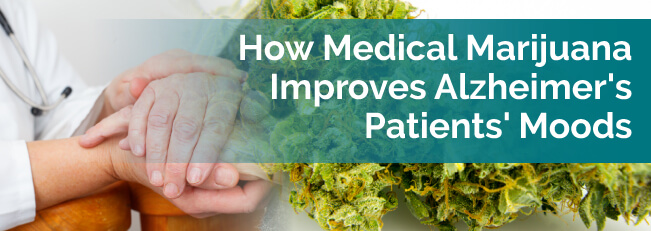
Alzheimer’s disease affects the cells and connections in the brain, changing the way they work. When connections get blocked and cells die, the brain can’t function as well.
One of the ways that brain changes caused by Alzheimer’s disease impact patients is by creating mood changes. A patient can have a total change in personality and behavior at times. The mood changes can make a patient have delusions, wander and isolate themselves from loved ones.
Medical marijuana can reduce the severity of mood and behavioral symptoms. While it can’t completely get rid of them, less severe symptoms make dealing with Alzheimer’s easier for both patient and caregiver.
When brain cells deteriorate, the patient’s mood functions are affected as well. Alzheimer’s disease blocks some of the connections between brain cells. The blockage prevents important nutrients from getting to the cells, which eventually kills them off.
In the early stages of Alzheimer’s disease, a patient can feel irritable, anxious or depressed. Extra symptoms that appear in later stages include aggression, distress, delusions and hallucinations. These symptoms cause some of the more distressing aspects of Alzheimer’s disease.
Depending on the strain of marijuana you use for treatment, you can find relief for all sorts of mood-related symptoms. We recommend searching for a strain that relieves multiple symptoms you deal with.
Marijuana consists of over 85 different cannabinoids — or cannabis compounds. We mainly look at two of the most well-known cannabinoids when examining marijuana’s mood-enhancing qualities: THC and CBD.
THC and CBD each have their own mood-changing qualities. As the compound responsible for marijuana’s euphoric effect, THC uplifts a person and makes them feel a “high.” CBD tends to relax the user and relieve their pain.
You can customize your marijuana medication regimen to give you the most benefits possible. For instance, if you deal with mood issues at a certain time of day, you can plan to take your medication around that time on a regular basis. Also, you can mix and match strains to address your different symptoms.
Since we often group marijuana and alcohol together as recreational depressants, someone might think the two affect depression the same way. Alcohol exacerbates depression symptoms. So, doesn’t marijuana?
Marijuana can function in many different ways, none of which cause symptoms like depression. Some folks react negatively to marijuana, but when it works properly for someone, it can actually relieve depression symptoms.
Irritability and aggression are two mood symptoms that are most difficult for patients and caregivers to deal with. Combined with memory loss and delusions, aggression can upset caregivers when they see someone they love in such a state. Aggressive episodes can also wear out and trouble the patient experiencing them.
A balanced strain with both euphoric and calming effects can ease the mind of Alzheimer’s patients who deal with aggressive episodes. Caregivers medicating a patient in later stages of the disease may want to medicate with food. Using something familiar like a meal rather than a pill can prevent scaring the patient with a drug they don’t recognize.
In addition to irritability and depression, Alzheimer’s can make the patient anxious. Whether it manifests as its own symptom or comes from delusions, anxiety is never enjoyable to experience.
Calming strains can relieve anxiety, allowing the patient to focus on recovery and symptom management. Just like with treating aggression, caretakers may want to medicate with food if the patient has severe Alzheimer’s.